Clifford Garstang's Blog, page 70
October 7, 2013
2013 Reading: Blacksnake at the Family Reunion by David Huddle
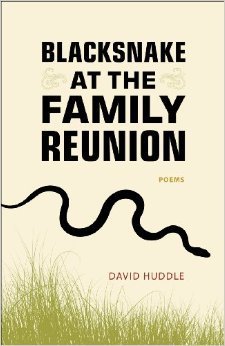 Blacksnake at the Family Reunion: Poems (Southern Messenger Poets) by David Huddle
Blacksnake at the Family Reunion: Poems (Southern Messenger Poets) by David Huddle
I thoroughly enjoyed this collection of poems by David Huddle, one of the finalists for this year’s Library of Virginia Award in poetry. The poems tell great stories–about the blacksnake at the family reunion, about the wife who doesn’t speak, about the man with a burned face, and so on. The poems explore childhood and relationships and family with great concision.
It’s a terrific book.
October 2, 2013
2013 Reading: Swoop by Hailey Leithauser
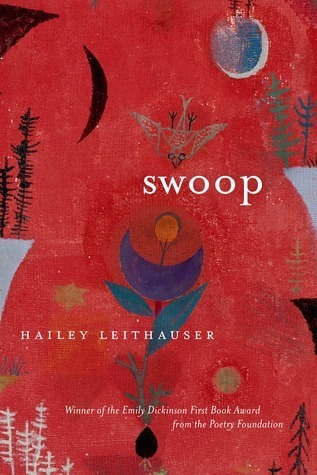 Swoop: Poems by Hailey Leithauser
Swoop: Poems by Hailey Leithauser
Good poetry is usually edifying, but it isn’t always fun. I get the sense that this poet had a blast writing these poems, which take full advantage of word play, aggressive rhymes, and playful rhythms. In fact, I’ve never read another book quite like it.
Many of the poems have short lines (many just 3 syllables); the poet is fond of palindromes; the short lines tend to emphasize rhymes; and there are more than a few puns throughout this short book.
Plus, look at that cover. Even if the poems weren’t smart and fun (they are) you could by the book just for the beautiful cover (a 1918 painting by Paul Klee).
2013 Reading: Daring Greatly by Brene Brown
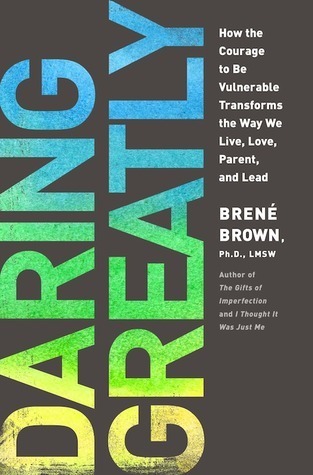 Daring Greatly: How the Courage to Be Vulnerable Transforms the Way We Live, Love, Parent, and Lead by Brene Brown
Daring Greatly: How the Courage to Be Vulnerable Transforms the Way We Live, Love, Parent, and Lead by Brene Brown
The fear of failure can be paralyzing, but so can the fear of already having failed–which is shame. So many people are immobilized by poor self-image, whether it is about appearance or performance. And we experience this sort of trauma from an early age, when people call us names, or parents/teachers/coaches belittle us for doing poorly in school or on the sports field. And the shame feeds on itself, making it harder to overcome.
On the other hand, if we can get past the shame and embrace vulnerability, we can achieve beyond our expectations. And, after all, you can’t win if you don’t play the game.
The title of the book comes from a wonderful quotation from Theodore Roosevelt’s speech “Citizenship in a Republic.” And what I liked about the book is that it isn’t all about feeling better about yourself, which many pop-psychology books seem to be. This book actually offers suggestions for empowering others, including your students, colleagues, and children.
September 30, 2013
The New Yorker: “I’m the Meat, You’re the Knife” by Paul Theroux
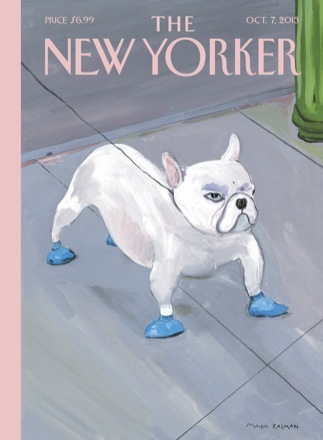 October 7, 2013: “I’m the Meat, You’re the Knife” by Paul Theroux
October 7, 2013: “I’m the Meat, You’re the Knife” by Paul Theroux
I gave up a long time ago on Theroux’s nonfiction, which struck me as being condescending—not only to the reader but even more so to the inhabitants of the countries about which he was writing. His fiction, on the other hand, I’ve always found appealing, and this story is no exception. I like it quite a lot.
The story’s protagonist, Jay, has returned to his home town (which happens to be Theroux’s home town), for the funeral of his father. Upon arrival, he learns that his high school English teacher—who had a profound impact on Jay’s career as a story-teller (a writer, we suppose—is dying in a local hospice. Immediately we see Jay’s story-telling on display in the comforting lies he tells his mother and sister. He goes to see his old teacher and begins to tell him stories. As we learn in the Q&A with Paul Theroux, these stories, unlike the ones he tells his family, aren’t meant to be comforting. They are, in fact, meant to drive home an important truth. They are lies, but they do tell Jay’s “emotional truth,” and I can’t say much more without spoiling the story. (Although it is behind the paywall, and many readers won’t be able to see it anyway.)
What Theroux is doing here, it seems to me, is revealing the enormous power and range of fiction.
It’s a very enjoyable, dark story.
September 25, 2013
storySouth Million Writers Award — Notable Stories
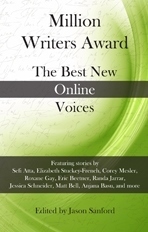 Each year, storySouth, a fine online magazine, runs the Million Writers Award competition. It’s a little unusual in that it has both popular and juried components to it. It begins with a long nomination process during which both online magazine editors and readers nominate their favorite stories from the past year. Then a panel of judges selects 50 stories as the year’s “Notable Stories.” Another panel then whittles that list down to 10, at which point readers are invited to vote to select a winner. I don’t love that last part of the process, if only because real money is at stake–through donations, storySouth offers some nice prize money–and I don’t believe that the prize should depend on who has the most friends.
Each year, storySouth, a fine online magazine, runs the Million Writers Award competition. It’s a little unusual in that it has both popular and juried components to it. It begins with a long nomination process during which both online magazine editors and readers nominate their favorite stories from the past year. Then a panel of judges selects 50 stories as the year’s “Notable Stories.” Another panel then whittles that list down to 10, at which point readers are invited to vote to select a winner. I don’t love that last part of the process, if only because real money is at stake–through donations, storySouth offers some nice prize money–and I don’t believe that the prize should depend on who has the most friends.
BUT, having said that, I’m all in favor of drawing attention to good writing in online magazines because those publications often get overlooked.
AND, I’m very pleased that I have an interest in 3 of this year’s Notable Stories.
First, there’s my own story, “Cousin Barnaby is Dead,” which appeared last year in Joyland. And then there are 2 stories from Prime Number Magazine, which I edit. They are “Treasures Few Have Ever Seen” by Mary Akers and “Art Lessons” by Gleah Powers.
I’d love it if we all made it into the top 10!
The New Yorker: “The Breeze” by Joshua Ferris
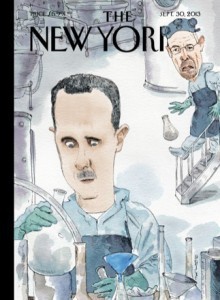 September 30, 2013: “The Breeze” by Joshua Ferris
September 30, 2013: “The Breeze” by Joshua Ferris
Some of the best stories in the New Yorker in recent years have come from Joshua Ferris (including “The Fragments” earlier this year). And I admire this one, although I found it annoying—in particular I found the protagonist annoying. So it was refreshing when I read this in the Q&A with Joshua Ferris: “A story like this makes a lot of demands and can kind of be annoying at first. Honestly, if I were to pick it up and start reading, I might put it down again . . .” Well, yes.
We begin with the husband coming home early from work because the wife is inspired by the first spring-y day to do something extraordinary. They set off on their adventure unpromisingly—neither feels strongly about exactly WHAT they should do. Been there! Done that! He’s deferring to her, but she doesn’t take control. So they plan an impromptu picnic, take the subway to Central Park, have sex in the bushes (!) and meet friends at a pub. Nice night. Except that isn’t apparently what happens. Instead of the picnic, they go to a bar. They argue about a movie. They still try to have sex in the park, but he can’t perform. They go to dinner. Or they don’t go to dinner. They go home together. Or she goes home alone.
At one point, a leaf in a spring breeze is described as a second hand on a broken watch—it ticks back and forth without making progress. And maybe that’s what we’re seeing here. The first warm day of spring that maybe isn’t spring yet, the indecision of nature. And as a couple, these people seem indecisive, and perhaps not right for each other.
The structure of the story is intriguing. It doesn’t make me hopeful for this couple.
September 23, 2013
2013 Reading: The Civilized World by Susi Wyss
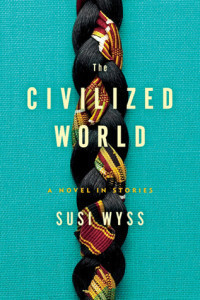 The Civilized World: A Novel in Stories by Susi Wyss
The Civilized World: A Novel in Stories by Susi Wyss
Even if the author were not a friend of mine, I would be writing about how wonderful this book is. I’m so sorry I didn’t read it when it first came out! But I’ve corrected that oversight now and I’m here to say you should read this book.
It says on the cover that it’s a “novel in stories.” After the first couple of stories–all wonderful–I wasn’t too sure about it being a novel. But soon the connections became clear and by the end there was no doubt. This is the story of Janice, an American woman who works on development projects in Africa after first going there in the Peace Corps. Her life intersects in Abidjan with Adjoa, a hair dresser from Accra. The stories give the reader several episodes from the lives of these women as well as a few others who play a role. The result is a completely satisfying whole.
This book won the Maria Thomas Fiction Award from Peace Corps Worldwide in 2011, the year after I won the same award for my book In an Uncharted Country.
Interested in Africa? Interested in Novels in Stories? Read this book.
Hampton Roads Writers’ Conference 2013

For the past several days, I had the pleasure of being down in Virginia Beach for the 5th Annual Hampton Roads Writers’ Conference. I won’t lie–it was a lot of work. I was invited to come to give 6 presentations (on 5 topics, one of them twice) over the course of the 2 days and one evening of the conference. I was honored to do so, although I did need to refine some talks that I’d given previously elsewhere, so there was a fair amount of prep time involved.
Still, I think it went pretty well. I started out with an evening session on “Creating the World in a Short Story.” The thrust of this session is that a writer has only 20 pages or so in a short story to do nearly everything expected in a novel–populating a world with credible characters, creating a vivid setting, showing a compelling plot, etc. That presentation included a writing exercise that I thought produced some interesting results.
The next day I had three sessions back to back: “Get Published!”, “Crossing the Border from Fact to Fiction”, and “Show AND Tell.” On Saturday I reprised “Get Published!” and also added “From Idea to Story”. The titles of these sessions pretty much tell you what they’re about. I think I enjoy doing “Crossing the Border” best.
I was NOT the only presenter at the conference, although it felt like it sometimes. HRW assembled a fun lineup including some terrific writers: Kevin Maurer, Lisa McMann, Lydia Netzer, and Jeanne Larsen, among others. A good crew, and I was pleased to be included.
September 22, 2013
Reading at The Writer’s Center
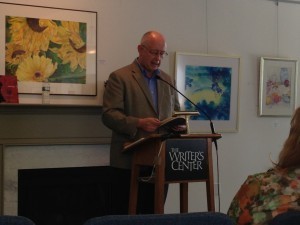 I had the pleasure and honor today of reading at The Writer’s Center in Bethesda, Maryland. This was especially meaningful to me because it was at The Writer’s Center that I first began to study writing and share my work in workshops. That’s unquestionably what got me started down this road, so it’s great to go back there to read.
I had the pleasure and honor today of reading at The Writer’s Center in Bethesda, Maryland. This was especially meaningful to me because it was at The Writer’s Center that I first began to study writing and share my work in workshops. That’s unquestionably what got me started down this road, so it’s great to go back there to read.
The other reader today was Hailey Leithauser, whose first collection of poetry, Swoop, is about to be released from Graywolf. I really enjoyed her reading and am looking forward to reading the book.
Thanks to everyone who came to the reading! (And thanks to Susanne Stahley for the photo.)
2013 Reading: Death by Black Hole by Neil deGrasse Tyson
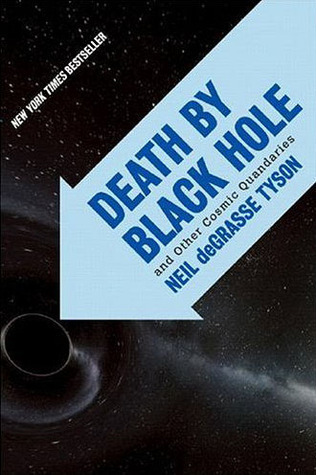 Death by Black Hole: And Other Cosmic Quandaries by Neil deGrasse Tyson
Death by Black Hole: And Other Cosmic Quandaries by Neil deGrasse Tyson
This book was the September selection for my Reading Liberally Book Club. And while I guess there won’t be too much to discuss, I expect everyone will like it. I sure did.
The book was constructed from Tyson’s columns in Natural History. As a result, there is some repetition and there is no narrative thread that holds the book together. No matter, each chapter is a morsel of fascinating information about the cosmos. I still can’t say I really understand what a black hole is, and there were a number of other chapters that were difficult for me to comprehend, but on the whole (I almost said “hole”), Tyson’s approach makes this book valuable for anyone, no matter how limited your understanding of science is.
We recently also read Carl Sagan’s Varieties of Scientific Experience, which I also enjoyed. But this book is more up to date, and Tyson’s prose style is even clearer than Sagan’s.
A terrific read for anyone who wants to come closer to understanding the cosmos.



